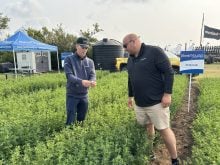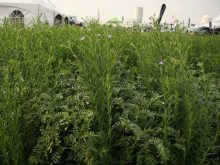Forcing farmers to declare the variety and take a sample every time they deliver a load of grain is a huge waste of time and money, says the National Farmers Union.
“Farmers will bear the cost of making the system work,” the farmers union said in a brief submitted to the Canadian Grain Commission.
“When it fails, farmers will shoulder the costs of contamination, even when such contamination is caused by grain companies or railways.”
The commission has proposed that whenever grain changes hands between the farm and the export vessel, a sample would be taken and a declaration signed stating that the grain is an eligible variety as defined by the CGC.
Read Also

Genetic resistance for anthracnose is on the way
anthracnose resistant lentil varieites are on the way according to Ana Vargas, University of Saskatchewan lentil and chickpea breeder. She also shared some management methods for the anthracnose in lentils.
The goal is to prevent the grain handling system from being contaminated by unregistered varieties that are visually indistinguishable from licensed varieties.
The commission has received 55 written briefs on the subject during the past two months.
In its submission, the NFU applauded the commission for tackling the issue of unregistered varieties, but described the VED plan as complex, unworkable, failure-prone and costly.
It proposes instead a combination of measures, including spot checks on grain entering country elevators, systematic sampling at selected elevators, strict and enforceable penalties for those who break the rules, increased education for farmers about the dangers of growing unregistered varieties and new rules to control the production of unregistered varieties.
It said any cost-benefit analysis of VED or any other system must focus on the net costs and net benefits to farmers.
An official with the Western Grain Elevators Association said primary elevator operators agree there is a problem but don’t agree that the VED proposal will solve it.
Wade Sobkowich said the grain companies’ concerns with VED can be broken down into three areas: who is to be held financially liable if contamination occurs, the significant cost of sampling and testing, and whether the proposed system is practical and workable.
“In theory it makes sense, but practically would you really be able to identify the producer or handful of producers that are the culprit?”
He said the WGEA is putting the finishing touches on an alternate and simpler proposal to deal with the issue until all the concerns with VED can be dealt with.
The Western Canadian Wheat Growers Association said that rather than putting new regulations in place, the best way to deal with unregistered varieties is to allow commercial pressures and market forces to work.
“It should really be the responsibility of the grain companies to monitor the system and ensure that they are not receiving or shipping a variety that would jeopardize the quality of the end product,” said WCWGA policy manager Paul Earl.
He said the issue can be handled through contracts that spell out responsibilities and penalties.
The costs of the proposed system are also a concern, he said.
“Costs should always be minimized and the best way to do so is through a competitive free enterprise system,” he said.
“Regulatory systems tend not to minimize costs.”
















